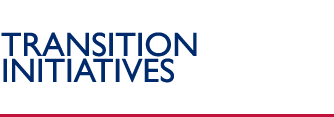Star Radio's Move Attracts Liberia's Top Politicians
USAID/OTI's BRDG-Liberia program (or the Building Recovery and Reform through Democratic Governance program) was launched in September 2006 to support the political transition prompted by the free and fair election of President Ellen Johnson Sirleaf, the first democratically elected female head of state in Africa.
The program helps further three specific political objectives:
- Assist the Government of Liberia and other key actors to improve capacity, with an emphasis on communication systems;
- Assist the Government of Liberia and other key actors to mount effective political responses to high-visibility issues;
- Support regional activities aimed at strengthening the Mano River Union.
The USAID Mission in Liberia, USAID's Africa Bureau, and the Office of Democracy and Governance are key players in the coordination of the BRDG program.
 |
| U.S. Ambassador Donald Booth (right) and station manager James Morlu cut the ribbon at the Star Radio dedication ceremony. |
Star Radio is considered one of Liberia's most credible independent radio stations; its programs are widely broadcast and popular. Former President Charles Taylor, now on trial for war crimes in The Hague, shut down Star Radio during his regime despite strong U.S. protest. And although the environment for independent media has improved since Taylor's time, the station continues to face significant obstacles as it provides the Liberian public with information vital to the fledgling democracy. In particular, Star Radio must ensure the long-term financial sustainability of its flagship Monrovia-based station and its network of six affiliate stations that provide local, national, and international news to rural Liberians.
To reduce Star Radio's operational costs and enhance its financial viability, USAID/OTI sponsored the station's relocation to a new studio, a move that cuts overhead costs by half. The new facility is well situated on Snapper Hill, a site that allows the station to locate its transmitter and antenna at an elevation that significantly extends its broadcast range. The new accommodations also provide additional space for operations.
On July 16, 2007, Star Radio and its board of directors held a dedication ceremony for the new site. U.S. Ambassador Donald Booth joined Vice President Joseph Boakai, the heads of several of the country's major political parties, and representatives of other radio stations at the event to inaugurate the new studio. In his remarks, Ambassador Booth described the important role that rural radio plays in promoting development and a building a sense of political inclusion in a post-conflict environment.
The event, which was broadcast live, sent a strong signal of support for a free and independent media as an instrument of democracy. And because Vice President Boakai and some of the country's major political leaders were present at the program, the Ambassador's remarks on the role and importance of independent radio reached the ears of decision makers whose actions can influence the development of the media sector in Liberia.
For further information, please contact:
In Washington: Donna Kerner, Deputy Team Leader, 202-712-0716, dkerner@usaid.gov
|


